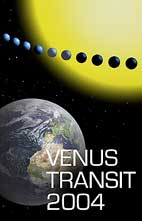

The Venus Transit 2004
... Brief InfoSheet D8
Is there life on Venus (and elsewhere in the Solar System) ?
Is there life on the planets and moons of the Solar System, is there life on Venus? Human beings have never been satisfied with the thought that life exists only the Earth. From the earliest times when they populated the heavens with gods, goddesses and supernatural beings, and to the space exploration activities of the 20th Century, many people have felt compelled to consider the key question: Is there Life on Other Planets?
In the 17th and 18th century - during the Age of Enlightenment - there was no doubt about it. Common people, scientists and especially philosophers believed that extraterrestrial life - intelligent life! - existed on other worlds: planets, moons, the Sun and the stars. In his satirical novel "Micromegas", French philosopher Voltaire (1694 - 1778) told how men from Sirius discovered our planet Earth.
Venus and Mars were long consedered prime candidates as an abode for intelligent life in the solar system because in telescopes they showed some similarities to the Earth: an atmosphere with clouds, seasons (on Mars) and faint dark variable features which could be continents. Fascinating surface features on Mars included red deserts and shining white polar caps which changed with the seasons. For Venus it was significant that the planet was only slightly smaller than the Earth and was densely covered with clouds. Until the end of the 1950s many scientists believed that the Venusian clouds were made of water vapour, and since the planet orbited the Sun closer than the Earth, the surface conditions on Venus could be tropical.
But what is the nature of life and where could it exist in the solar system? There are two major distinguishing characteristics of life: reproduction and evolution . Actually, we know for certain of only one place in the solar system where life has developed and can exist: our blue planet Earth. By studying the Earth we have gained some appreciation of the kind of environments that are conducive to life. We now know that liquid water is a key prerequisite for life and that its abundance on the Earth has been a key factor in the evolution of life. It is therefore reasonable to look at other worlds in the solar system where liquid water could exist because its presence signals the possibility of life.
The best places to look for life in the solar system are Mars, Europa and Titan. But is Venus really uninhabitable? This may be true for the surface but perhaps not for the Venusian atmopshere. At the end of 2002, German astrobiologist Dirk Schultze-Makuch argued that the Venusian clouds could be an abode for life. The temperature at a height of 50 km above the surface of Venus is only between 30 and 80 degrees and the pressure is similar to sea level pressure on Earth.
The fact that water exists at only a very low concentration is not a real obstacle to the existence of biological cells in Venus' atmosphere. In recent years, investigations of geysers, oil wells and volcanoes have shown that life can exist even in those extreme environments in the shape of heat-resistant bacteria.
Want to know more?
This topic is discussed in a more detailed way in the associated Extended InfoSheet.
Back to the List of Brief InfoSheets.
